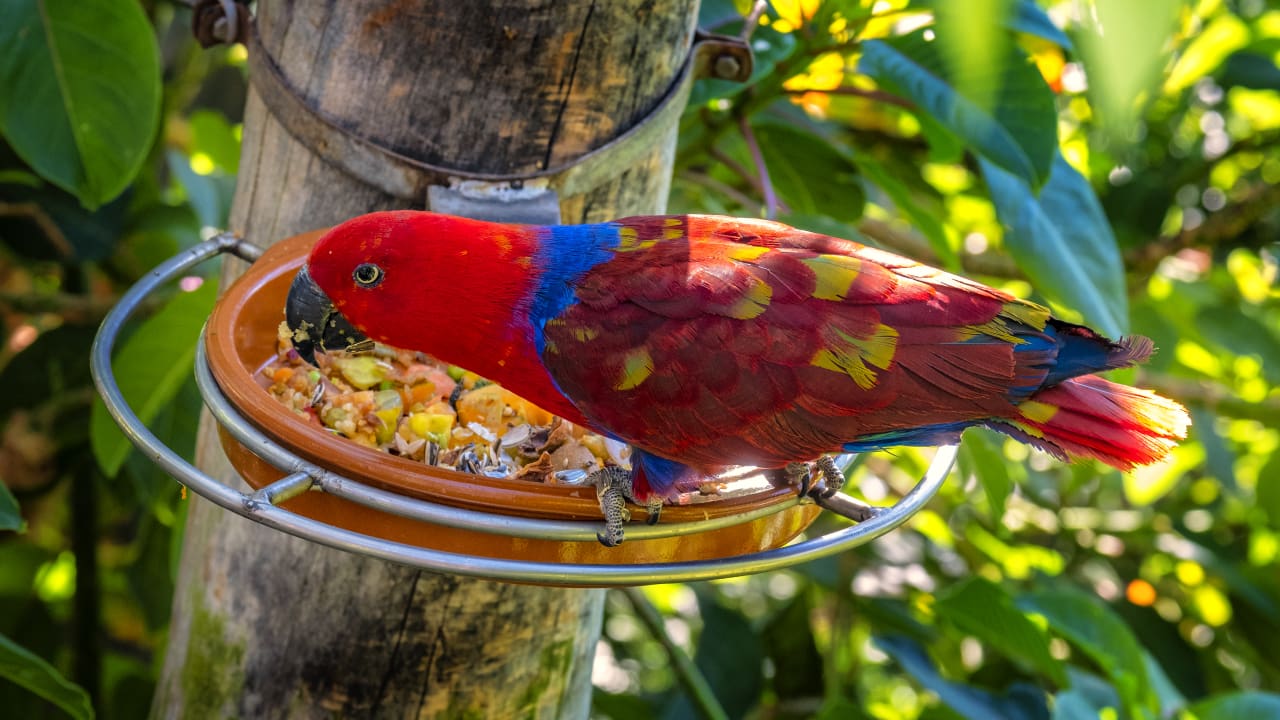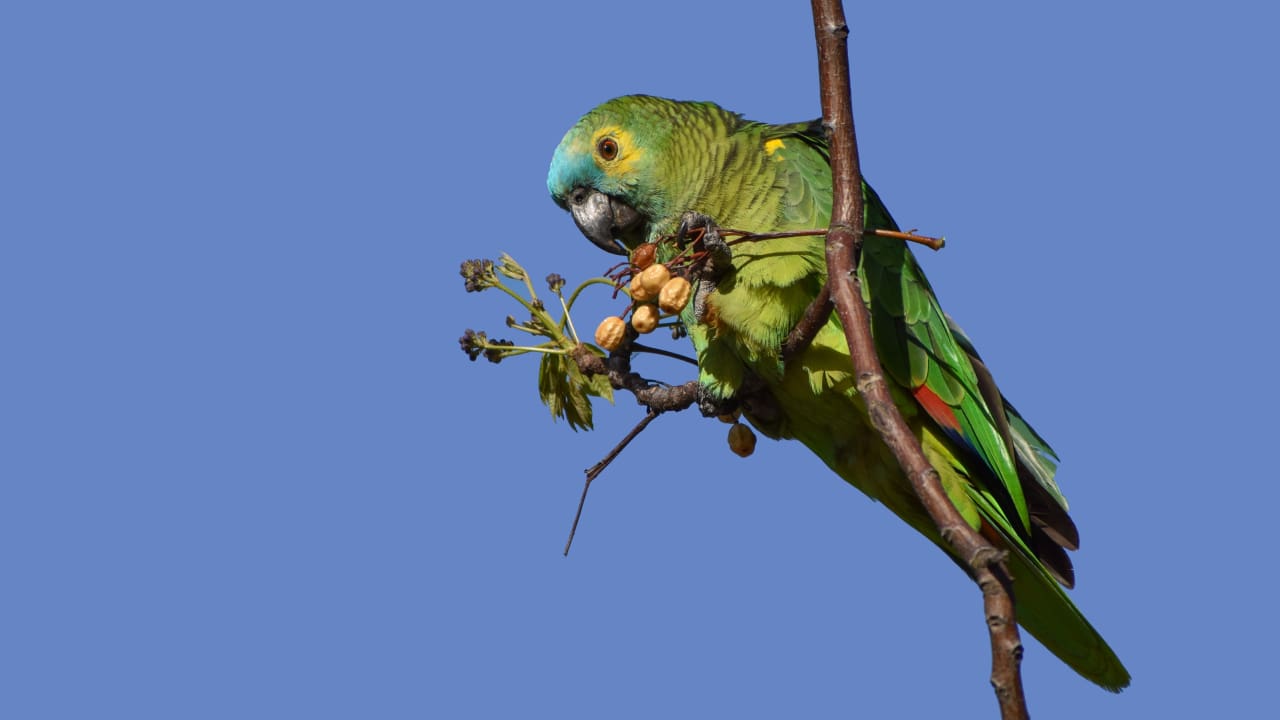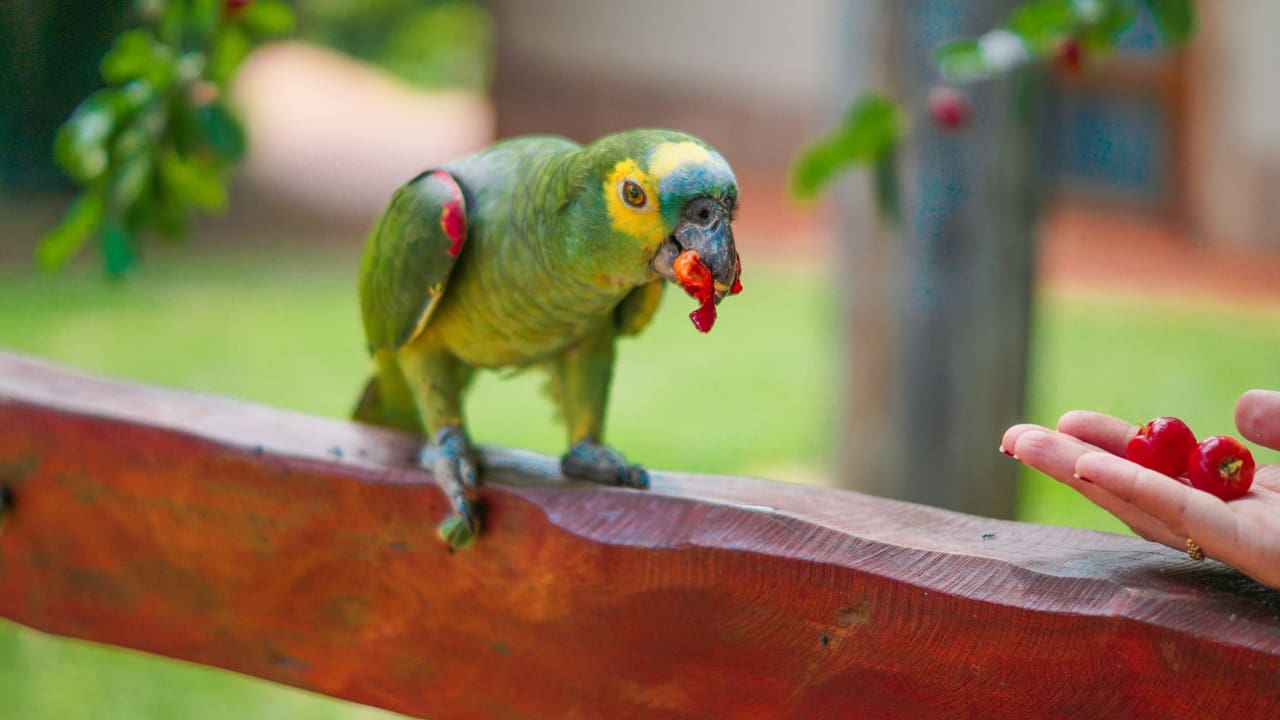Inquisitive, social, and smart, macaws are jacks of all trades when it comes to being birds. But that curiosity can also lead them into trouble, especially when it comes to food. Most fruits, veggies, and grains are great for macaws, but several human foods could be lethally toxic to a macaw. Their digestive systems are sensitive, and what may be harmless or even beneficial for humans can be poisonous to birds, in some cases, even deadly.
Table of Contents
This ultimate guide outlines the toxic foods and substances that are poisonous to birds, so you won’t accidentally harm your macaw.
Toxic Foods For Macaws to Avoid

This section includes details about hazardous foods and how to protect your macaw. For safe food options, visit our guide on the best food for macaws.
1. Common Household Foods
Here are some poisonous foods for birds:
Avocado
The avocado is a toxic or poisonous fruit to birds. It is entirely harmful to birds. The fruit contains persin, a substance made from fatty acids that is harmless to humans and deadly to macaws. Even a small amount can cause heart damage, difficulty breathing, and, in rare and severe cases, death. Avocados (fruit, bark, pit, and leaves of the “Aguacate” tree) are toxic/poisonous to birds.
Caffeine (coffee, tea, energy drinks)
Birds have an extremely low threshold for caffeine – at all levels, as low as 85 mg, it can be lethal in birds. Caffeine is present in coffee, tea, soda, and energy drinks. In birds, specific concerns include hyperactivity, cardiac arrhythmias, cardiac arrest, tremors, seizures, and, on rare occasions, death. A drop of anything with caffeine is poison to a macaw.
Chocolate
Chocolates contain theobromine and caffeine, which are extremely toxic to birds. The darker the chocolate, the more cacao is present in it. Consumption of chocolate can result in vomiting, diarrhea, tremors, seizures, and death. Never give your bird chocolate or anything containing cocoa.
Alcohol
Birds will be drunk and have alcohol on their breath. Even small amounts can result in confusion, lack of coordination, respiratory distress, liver damage, or death. Birds have a low tolerance to alcohol because of their size and metabolism, and should not be exposed.
Salt
Sodium is not much of a concern for birds, as they require extremely small amounts in the diet. Foods that are high in salt content – like chips, crackers, or canned goods – will make your pet thirstier, and he’ll drink more water than he usually does.
Related Pick: Macaw as a Pet – Everything You Need to Know!
It leads to potentially fatal water overconsumption, as well as dehydration, vomiting, diarrhea, depression, tremors, elevated body temperature, seizures, and even fatality. What you consider to be a harmless snack could kill your bird.
Fatty Foods (chips, fried things, fatty meat)
While a bird requires some natural fat in its diet, there is bad fat in manufactured human foods, levels of which in a bird’s body can kill it. Macaws chronically eating fatty foods become obese, can have fatty liver disease, and other metabolic diseases. Don’t let them eat fried foods, fatty meats, or butter.
2. Vegetables and Fruits to Avoid
Avoid giving these fruits and vegetables to your macaws:
Onions
Macaws should not be fed raw, cooked, powdered, or dehydrated onions. They have a sulphur molecule and can result in red cell destruction (haemolytic anaemia), gastrointestinal distress, and depression. Even small amounts combined over time can carry a risk.
Garlic
Similar to onions, garlic also has sulfur compounds, which can be harsh on red blood cells. While it is sometimes used as an antimicrobial on other animals, it should never be used on birds.
Apple Seeds
This is because apple seeds contain cyanogenic glycosides, which are even turned into cyanide when you chew and ingest them. The apple is non-toxic, but always remember to de-seed it before serving your parrot.
Cherry, Apricot, and Peach Pits
The seeds of these fruits also contain small traces of toxin. Eating the seeds can be toxic, especially if the bird can crush them so they’re released in the stomach and intestines. Always remove pits before offering fruit.
Tomato Leaves and Stems
Ripe tomatoes can be given once in a while as a “treat,” but not often. The ripe or unripe tomato plant, as well as the leaves and vines, contains solanine, which is harmful to birds. These parts must be completely avoided!
Raw Potato and Potato Eyes
Raw potatoes and all other parts of the green plant cause food poisonous to birds because they contain solanine, a toxic alkaloid. Small amounts of potatoes are generally safe, but the raw kind should be avoided completely.
Rhubarb
This tangy veggie is high in oxalates, which can block calcium absorption and even lead to kidney failure. Rhubarb, the leaf-and-stem plant, is unsafe for parrots.
Spinach (in excess)
It’s a repository of oxalates, a substance found in so many plants that can, over time, inhibit calcium absorption, possibly contributing to problems like weak bones and kidney strain. Occasionally, small amounts may be okay, but frequent feeding is discouraged.
Citrus Fruits (in excess)
Not that these are harmful to our health by any means, but citrus fruits such as oranges, lemons, and grapefruit are very acidic, and that can be harmful. In large doses, they can be tough on the gut and potentially disrupt calcium metabolism. Giving a little is fine, but the trick is moderation.
3. Artificial or Processed Ingredients
Avoid these artificial and processed ingredients in your bird’s diet:
Xylitol (sugar-free gum, baked goods, candies)
Natural product ingredient Xylitol is a natural sweetening component of many sugar-free products. In macaws, xylitol causes a quick plunge in blood sugar (hypoglycemia), with life-threatening results, and can induce the death of liver tissue. Even the small amounts can be life-threatening.
Nutmeg
Nutmeg is full of a natural compound called myristicin that can be lethal in minute quantities. It can also affect birds’ central nervous systems, leading to seizures, disorientation, or shaking.
Sugary Beverages (soda, sweetened drinks)
Sugary soft drinks are junk food with empty calories, known to contribute to obesity, diabetes like symptoms, and as well as behavioural problems. Avoid drinks that have obscene amounts of sugar, artificial dyes, and additional flavors!
Butter and Cheese
This is because birds are lactose intolerant and do not handle lactose well. Diarrhoea, bloat, and discomfort can all follow the consumption of butter, cheese, milk, and cream.
4. Raw or Improperly Cooked Foods
Avoid feeding your parrot these raw or improperly cooked foods:
Mushrooms (wild or unverified types)
Some mushrooms contain poisons that work on the digestive tract or the nervous system. It can be difficult to tell which mushrooms are safe versus which could be a dinner-time emergency, so I would recommend never feeding poisonous mushrooms to your birds!
Uncooked Dried Beans
Raw beans have hemagglutinin, a toxin that can disrupt digestion and can be fatal to birds. They must be cooked thoroughly (boiled and not just soaked) before offering them to your macaw.
Moldy or Spoiled Foods
Rotten or mouldy food may have fungal mycotoxins that are poisonous to birds. These are toxic to the liver and kidneys and can result in sudden death. Don’t forget to ensure the food you are feeding your parrot is fresh.
5. Heavy Metal Toxicity
Macaws are also at risk from toxic foods, as well as heavy metals that can be found in the home. Given that macaws “manipulate their environment with their beak,” metal is another source of toxicity, caused by objects like cage wires, hardware, and toys, in particular lead and zinc toxicity.
Lead Toxicity
Sources of lead exposure:
- Paint chips in older homes and on furniture
- Curtain or fishing weights
- Imported toys or jewelry(especially those with solder or enamel)
- Lead-based stained glass or mirrors
- Antique metal dishes or cage bars
Parrots are high-energy chewers, and it’s easy to see how lead can act as a bird poison, potentially causing dangerous lead poisoning in your macaw.
Clinical Signs of Lead Poisoning:
- Weakness or lethargy
- Vomiting or regurgitation
- Loss of appetite
- Green or black droppings
- Ataxia (uncoordinated movements)
- Seizures
- Head tilting or tremors
If you notice any of these signs and you think the bird has eaten something bad, don’t wait and get on the road with your bird to see your veterinarian. The diagnosis of heavy metals in birds is most frequently achieved through blood samples and X-rays.
Zinc Toxicity
Another heavy metal is zinc, which is frequently found in:
- Galvanized cage bars or mesh
- Chains, screws, and fasteners
- Some coins
- Coated metal food dishes
- Cheap or imported bird toys
Birds may bite or swallow chips and fragments, or rust their objects while playing or chewing.
Clinical Signs of Zinc Poisoning:
- Vomiting
- Excessive thirst (polydipsia)
- Weakness or lethargy
- Weight loss
- Feather plucking
- Neurological signs (incoordination, seizures in advanced cases)
You Might Like to Read: How to Teach Your Macaw to Talk?
Zinc poisoning can be as lethal as lead poisoning, and that’s yet another reason not to eat that metal! By consistent or prolonged use, even mild effects can accumulate and intensify. If suspected, the bird should undergo immediate testing and be treated promptly. Treatment is frequently the administration of chelation therapy and supportive care.
If Your Bird Eats Something They Shouldn’t – What To Do?

Even if you do your best, accidents happen. If that happens, knowing how to respond quickly and effectively is key. An easy-to-understand guide on what to do if they swallow an item:
Stay Calm
An alarm response can ruin your reaction or spook the bird again. If you were holding your breath, take a long, slow inhale and try to figure out the situation.
Remove the Substance Immediately
However, if you witness your bird consuming something that poses significant harm, be sure to immediately remove it. Then clean everything up so your avian family member doesn’t consume any more of this particular food.
Don’t Try Home Remedies or Induce Vomiting
Physically, birds are so much less like humans or dogs. It is dangerous to induce vomiting because you can choke or suffer further injury. Activated charcoal and other detox treatments should be administered under the direction of a veterinarian.
Call an Avian Veterinarian Immediately.
Not all vets have experience with birds, so keep the phone number for your avian vet or the number for your exotic pet emergency clinic on hand. Tell them exactly what your parrot consumed, how much, and when.
Save the Packaging or Sample of the Ingested Item
This item might help the vet determine what is poison to birds and get the right cure. So, the bird might have a better quality of life after treatment.
Observe Your Macaw Closely
You might not see symptoms right away; just give it time. Feel free to make a note of any changes in droppings, behavior, stance, appetite, or breathing a few hours after the exposure period to start tracking the bird’s activity.
For more info about natural habitat dangers, check out our guide on Amazon rainforest animals, where macaws originate.
Foods That Are Poisonous to Birds

Macaws are highly sensitive species, and they can be sensitive to many common human foods. Even the smallest amounts can cause serious health issues in them, leading to death. Here is a comprehensive list, and I’ve compiled it for clarity that which foods are poisonous to birds!
| Food Item | Toxic Compound / Issue | Effect on Macaws |
| Avocado | Persin | Causes heart damage, respiratory distress, and can be fatal. |
| Caffeine | Caffeine and stimulants | Overstimulates the heart and nervous system; can lead to seizures and death. |
| Chocolate | Theobromine and caffeine | Even small amounts are toxic; causes vomiting, tremors, seizures, and death. |
| Onions and Garlic | Sulfur compounds (thiosulfate) | Can cause hemolytic anemia, gastrointestinal irritation, and lethargy. |
| Xylitol | Artificial sweetener | Leads to rapid insulin release, hypoglycemia, and potential liver failure. |
| Fruit Pits and Apple Seeds | Cyanogenic glycosides (cyanide) | Disrupts cellular respiration; potentially fatal if consumed. |
| Alcohol | Ethanol | Depresses the central nervous system and damages the liver and kidneys. |
| Salt | Sodium | Causes dehydration, kidney dysfunction, and electrolyte imbalance. |
| Fatty Foods | Excessive fat content | Leads to obesity, fatty liver disease, and other metabolic issues. |
| Mushrooms | Various toxins depending on type | May cause digestive issues, organ failure, or be fatal in some species. |
| Dried Beans (uncooked) | Hemagglutinin | Interferes with protein absorption; must be thoroughly cooked to be safe. |
| Tomato Leaves and Stems | Solanine | Toxic alkaloid causing gastrointestinal and neurological issues. |
| Rhubarb | Oxalates | Can cause kidney failure and calcium imbalance. |
| Citrus Fruits (in excess) | High acidity | Irritates the digestive system and may interfere with calcium absorption. |
| Sugary or Caffeinated Beverages | Sugar, caffeine | Leads to hyperactivity, arrhythmia, and long-term organ damage. |
| Raw Potato and Potato Eyes | Solanine | Toxic to birds; can affect the nervous system and digestive tract. |
| Moldy or Spoiled Foods | Mycotoxins | It can cause hallucinations, organ stress, and toxicity in birds. |
| Nutmeg | Myristicin | Can cause hallucinations, organ stress, and toxicity in birds. |
| Spinach and High-Oxalate Greens | Oxalates | Inhibits calcium absorption; long-term use may affect bone and kidney health. |
| Butter and Cheese | Lactose | Birds are lactose intolerant; dairy causes digestive upset and diarrhea. |
Conclusion
They are beautiful, funny, and flippin’ smart, but they’re also real “busy bodies” in ways that can cause trouble. Most of the things you can eat that parrots can’t are actually poisonous to birds, not only make them sick, but they will also kill them. Many things should never be given to a macaw, ranging from everyday foods, snacks, and even some fruits and veggies listed above.
Along with food, the unseen hazards of heavy metal poisoning from lead and zinc must be taken seriously, especially for birds that love to chew on their surroundings.
Prevention is the key
- Provide your parrot with a habitat that is clean, safe, and free of toxins.
- Only offer bird-safe labeled food.
- Tell all family members and visitors what not to feed the bird.
- Always ask your avian vet before introducing any new food items.
Understand the various types of macaws to meet their needs, and by following these essential steps, you can ensure they live the longest, healthiest life possible.
